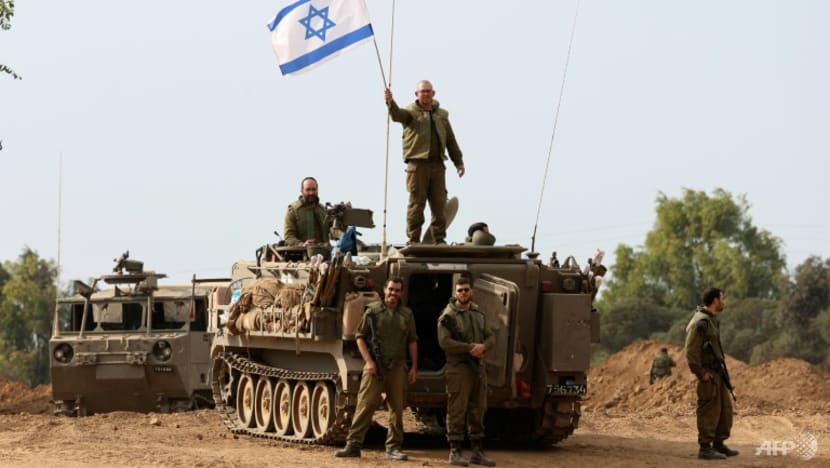Hostage situation ‘immensely complicates’ Israeli response to deadly Hamas attack: Observers
The Israeli government is under pressure to both mount a major response against Hamas, and bring the hostages safely home, says an analyst.

Israeli soldiers wave their national flag as they take positions in armoured vehicles near the border with Gaza in southern Israel (Photo: AFP/JACK GUEZ)
The fate of dozens of hostages captured during Hamas’ devastating incursion into Israel complicates Israel’s options for response and has made retaliation more difficult, observers said.
Already, Hamas – the militant group that controls Gaza – has threatened to kill Israeli captives if Israel’s bombing of civilian areas continues without prior warning.
Israeli Defense Minister Yoav Gallant has ordered a “complete siege” on Gaza, launching strikes from the air and sea at Hamas targets.
This follows Saturday’s (Oct 7) surprise attack by Hamas that resulted in Israel’s bloodiest day in decades, with more than 800 killed and an unconfirmed number of people abducted.
“The Israelis now have to take into account the fate of those who have been taken hostage by Hamas, and they may very well face impossible choices,” said Dr James Dorsey, an adjunct senior fellow at the S Rajaratnam School of International Studies.
“Do they give weight to the military operation? Or do they give weight to the security and safety of those who have been taken hostage?” he asked.
CNA938's interview with Dr James Dorsey
HOSTAGE SITUATION
Professor Dov Waxman, Rosalinde and Arthur Gilbert Foundation Chair on Israel Studies at the University of California, Los Angeles (UCLA), said the hostage situation “immensely complicates matters” for the Israeli government, which is under pressure to both mount a major response against Hamas, and bring the hostages safely home.
“Hamas is effectively using them (the hostages) right now as human shields, hoping that their presence will deter (Israeli forces). This puts the Israeli army in a very difficult position,” he said.
“There is a huge amount of public pressure for the Israeli army to deliver a blow against Hamas. But at the same time, there is also concern about not jeopardising the lives of Israelis held hostage inside the Gaza Strip.”
Israel is no stranger to hostage situations. In 2006, Hamas’ seizure of young Israeli soldier Gilad Shalit lasted years and ultimately resulted in the release of more than 1,000 Palestinian prisoners in exchange for his freedom.
“Hamas is counting on that (the prisoner exchange) to continue, and also counting on this to restrain the Israelis from attempting to either invade or from raining down as much fire and fury as they possibly can,” history professor James Gelvin from the UCLA told CNA’s Asia First.
IMPENDING GROUND OFFENSIVE
Israel has imposed a total blockade of the Gaza Strip, including a ban on admitting food and fuel, and on Monday called up an unprecedented 300,000 reservists in a sign that experts say is an impending ground assault.
“We're already seeing the early signs of (a massive ground offensive) with the amassing of Israeli troops on the Gaza border. There’s a strong public demand in Israel for the army to take strong and decisive action against Hamas,” Prof Waxman told CNA’s Asia First on Tuesday.
He added that the war is likely to escalate and last longer than previous conflicts in the region, noting that civilians in the Gaza Strip will suffer the most.
“Hamas has already demonstrated that it's willing to engage in terrorism against Israel, even at the risk of bringing devastation on Gazans. It has not displayed any concern for the welfare of civilians in Gaza,” he said. “So, (Israel) attacking Gaza and affecting the welfare of civilians isn't going to change Hamas' calculation, unfortunately.”
CONFLICT COULD SPILL OVER
There is fear that Hamas’ attack could embolden other military groups and the conflict could spill over on multiple fronts.
“The danger of a regional escalation is certainly there on the Lebanese border with Hezbollah. The operation by Hamas is going to certainly embolden the militants on the West Bank,” Dr Dorsey told CNA938.
Tensions were heightened on Israel's northern border with Lebanon as Israeli forces exchanged artillery and rocket fire with powerful armed group Hezbollah on Sunday.
“If this situation, which is very, very fragile, escalates into a larger confrontation between Israel and Hezbollah, then that would dramatically escalate this war,” said Prof Waxman, noting that Hezbollah has a more sophisticated military arsenal compared to Hamas, with precision guided rockets that can strike buildings in Israel.
“There's also the risk that Iran could be drawn into this, given the fact that Iran and Hezbollah are supporters of Hamas. So there's a real risk that this could escalate into a broader war,” said Prof Waxman.















